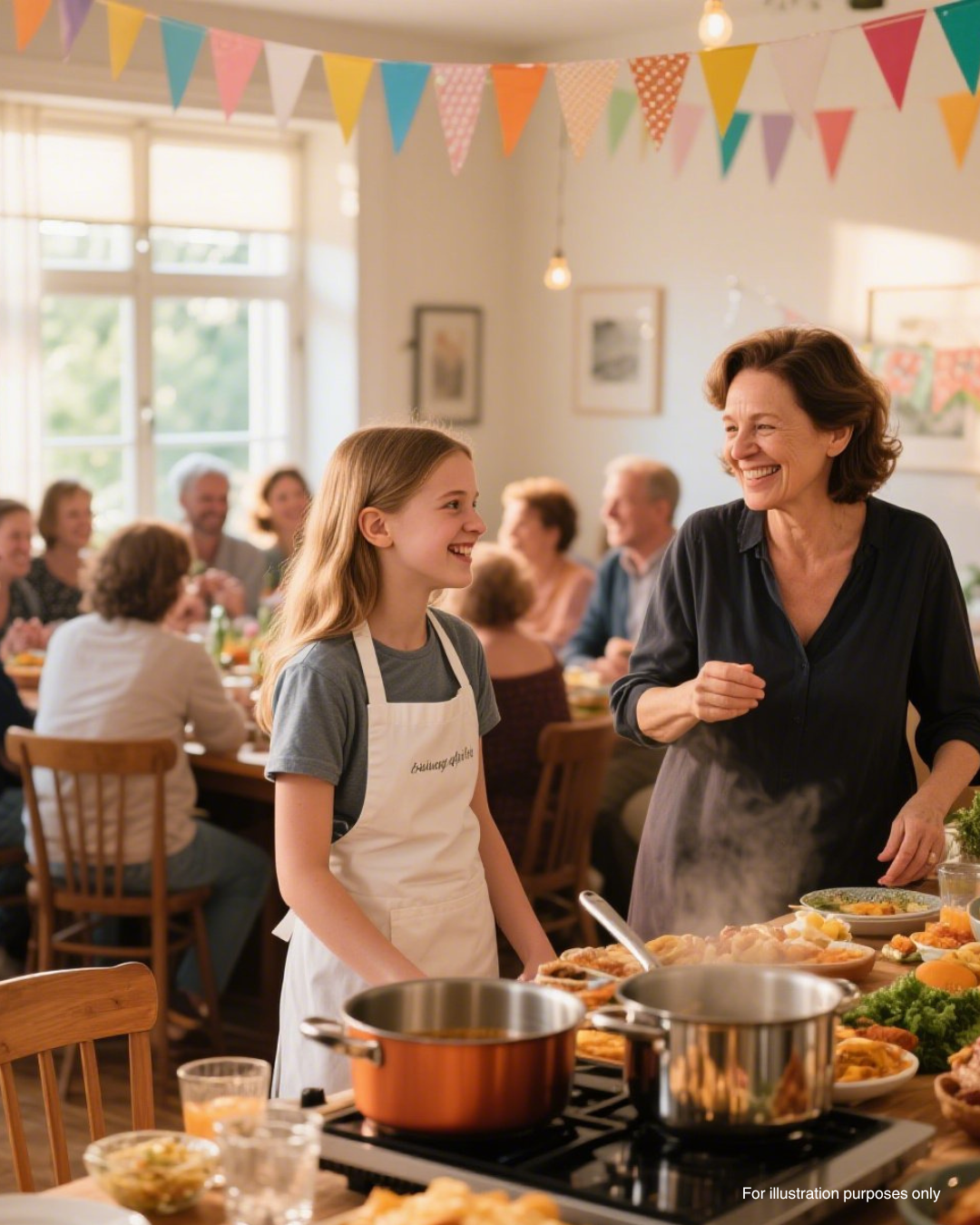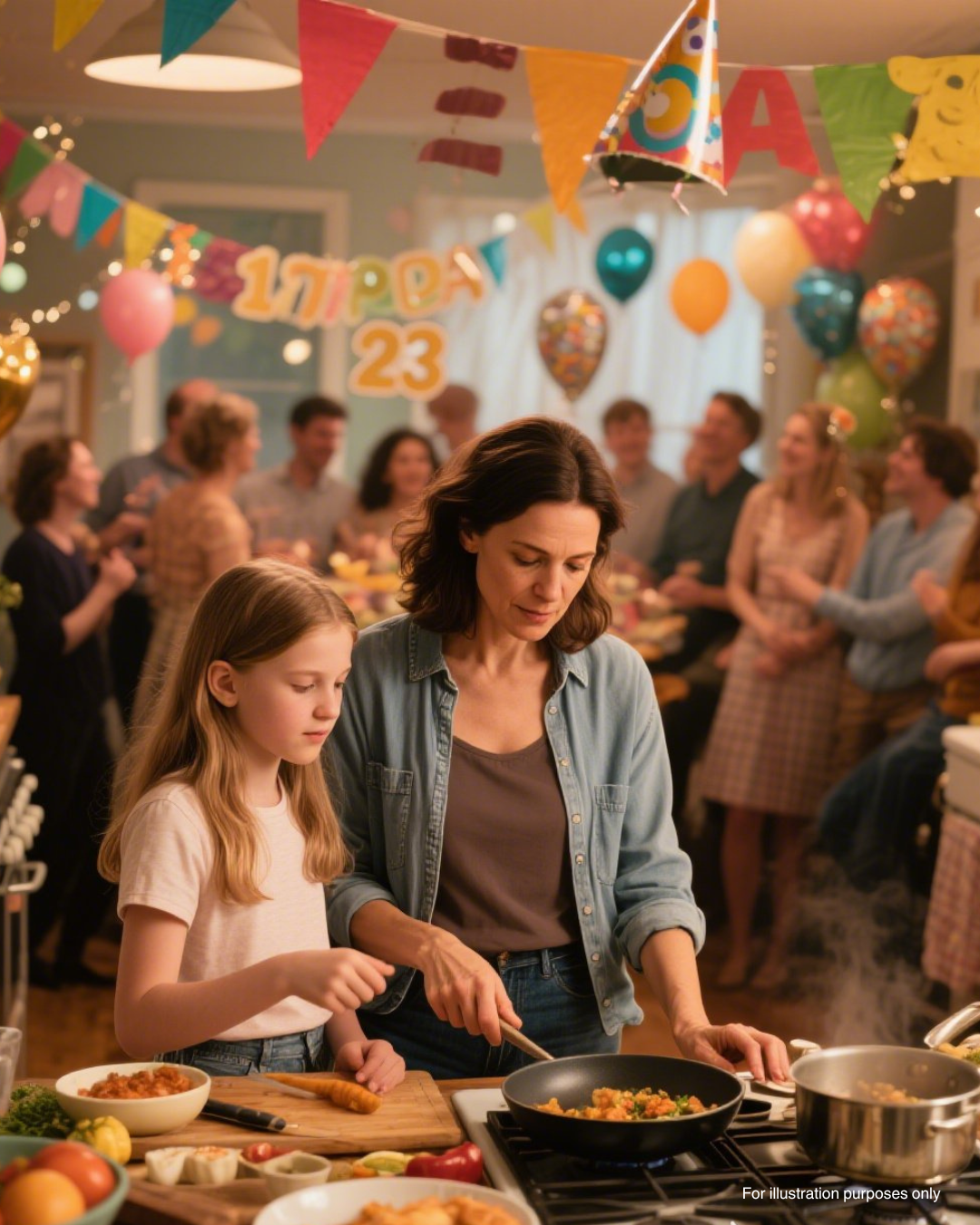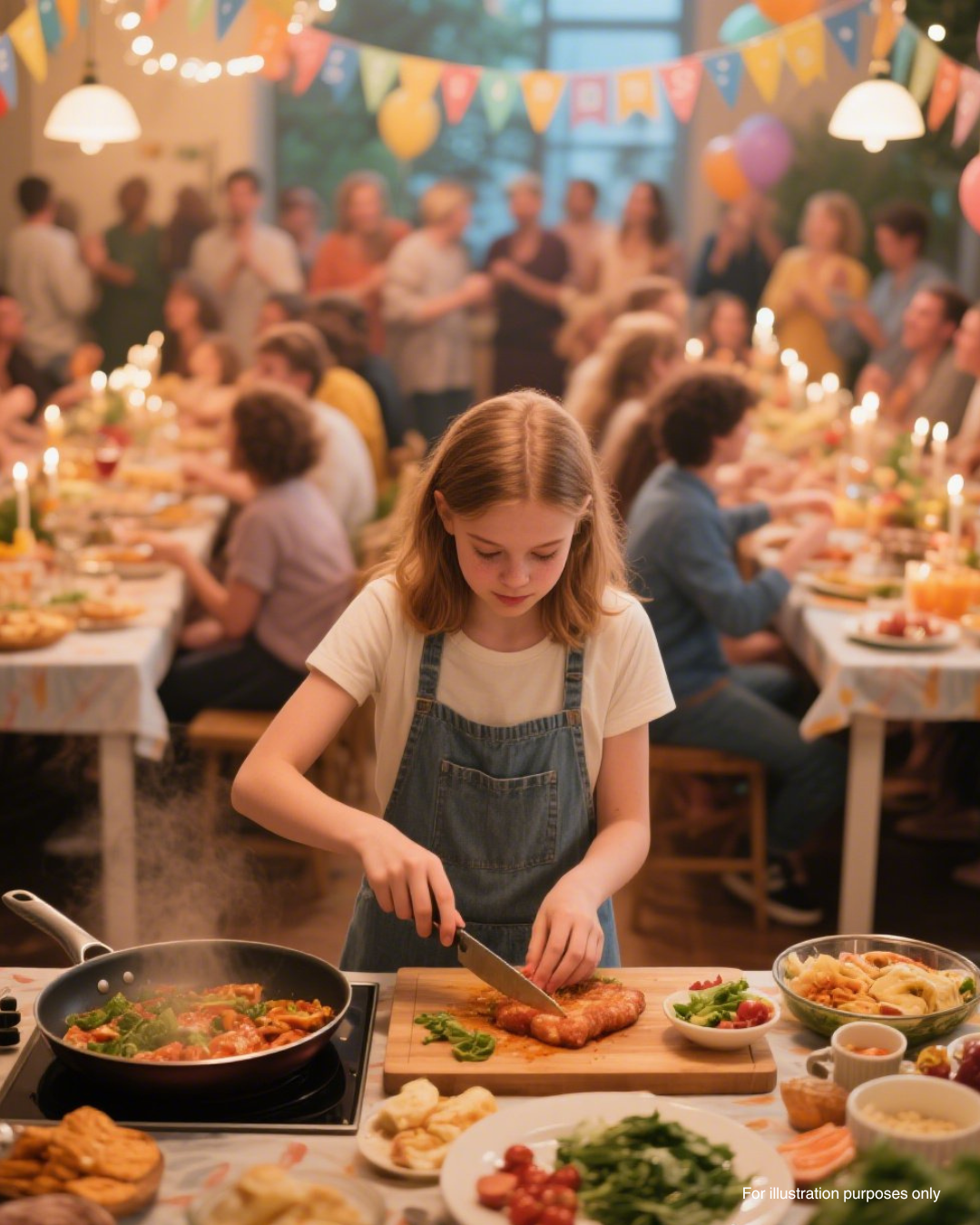My Daughter. My Heart. My Karma—But in the Best Possible Way.
She’s like me. But braver. Bolder. Unapologetically herself.
While other teens scroll TikTok, Ava pores over restaurant reviews. She treats a sauce reduction like a symphony. She once cried—real tears—because her hollandaise lacked “emotional depth.” I still don’t fully know what she meant by that. But I loved her more for it.
Ava doesn’t just like to cook. She wants to be a chef. She speaks about mise en place like it’s a personal doctrine. She’s seventeen, and already mapping out her culinary future, toggling between patisserie and savory like someone choosing colleges for a child not yet born.
But then… there’s the family.
“Oh, it’s cute that she plays in the kitchen,” they say.
“She’ll grow out of it.”
“She’s too soft for that industry.”
“Maybe she should be more like her aunt. Something academic.”

Right. Because what the world really needs is another broke PhD with student loans and no job prospects.
I’ve watched Ava bite her tongue so often, I’m surprised she has any left. After one family brunch, she locked herself in the bathroom for 20 minutes. When I asked if she was okay, she blamed it on onions she chopped six hours earlier. My girl’s a fighter. But she’s also seventeen. And it hurts.
So when she came to me one evening, her voice a fragile whisper, and said, “Mom, I want to cook for Grandma’s birthday this year. The whole thing. Just me.”
I was stunned. And proud.
She knew exactly how brutal they could be. But she wanted to face them anyway. I asked her three times if she was sure. Each time, her nod got firmer.
“I want to show them what I can do,” she said.
And show them she did.
She made a menu. Designed and printed it herself. Structured the kitchen like a five-star brigade. She remembered every allergy, every aversion, every picky quirk.
My dad doesn’t eat mushrooms.
My mom says cilantro tastes like soap.
Ava adjusted for both.
She used her own money to shop. Borrowed a cake turntable from a friend to practice her frosting lines. Every night she showed me her list—little checkmarks by each task—and asked, “Do you think they’ll like it?”
I always said yes. But inside, it broke me that she had to ask.
The day of the party, she was up at 5 AM. Pans clattered, classical music played softly, and the smell of roasted garlic and fresh pastry filled the air. She danced across the kitchen tiles in heels, hair tied up, eyes focused.
By 4 PM, she was glowing. Tired, yes. But radiant. Like a girl walking in her calling.
And then?
They didn’t show.
Not one of them.
My parents. My sister. My niece and nephew. Even the ones who usually slink in late with store-bought dip. They all went to a restaurant instead.
They didn’t cancel. Didn’t call.
Just… left.
She stood there, next to her three-tier cake—piped with chocolate curls and crowned with candied violets—and whispered, “We should throw it all out.”
No.
Absolutely not.
“If they won’t eat it,” I said, “someone else will.”
“Like who?” she asked.
I didn’t have an answer yet. But my hands were already moving. Scrolling. Texting. Calling.
First: my husband. “Come home. Now.”
Then: old friends, neighbors, my cousin Sam—black sheep of the family for calling our parents out when no one else would.
I even called the receptionist at my dentist’s office. I didn’t care. I just said:
“My daughter made 23 meals. They abandoned her. I need people who can eat. Now.”
This wasn’t an invitation. It was a summons.
And to my surprise—people came.
By the time my husband pulled into the driveway, cars were already lining up. A neighbor brought wine and his entire family. A woman I barely remembered from book club showed up with flowers and her teenage son.
It felt like a potluck revolution. Protest, plated.
Ava stood frozen in the hallway, whispering, “What are you doing?”
“I’m salvaging your dignity. And dessert. Help me find more chairs.”
She blinked. Processing. Then moved.
We shoved tables together, laid out the food. By the time the third wave of guests arrived, Ava was quietly whispering to herself in the kitchen, panicking over sauce temperatures.
Then the journalist arrived.
No, I didn’t invite her. Someone else did. Friend of a friend. Food media. She came with a camera bag and a hunger for both story and starch.
“I heard what happened,” she said. “Is it okay if I try a few dishes?”
Ava froze. Deer-in-the-soufflé-lights. I answered for her. “Yes.”
And handed her a plate.

She didn’t just taste—she savored. She asked about the ingredients. Took notes. Took pictures. Then she leaned toward me and whispered, “You know she’s better than half the professionals I’ve reviewed, right?”
“Tell her that,” I replied.
Eventually, the room settled. All 23 seats were filled.
Ava peeked out. “Should I serve the appetizer?”
“No,” I said. “You should serve your menu.”
And she did.
The murmurs started softly.
“Wait—is that lavender?”
“This is insane.”
“Who is this kid?”
By the main course, they were clapping. By dessert, someone stood up and toasted her. To Ava—the girl who cooked a feast, refused to be erased, and fed us better than anyone we’ve ever paid.
They gave her a standing ovation.
Then came the second cake—not hers, just a grocery store backup someone brought “just in case.” But they insisted Ava cut her own.
She did.
Smiled—small, real. And I finally let myself breathe.
But it wasn’t over.
At 2 AM, I got a text. A link. The article was already live.
“The Birthday That Wasn’t: How a Teen Chef Cooked for 23 and Was Abandoned—But Served the Most Memorable Dinner of the Year.”
It didn’t name my parents. But it named Ava. And it told the truth.
The whole truth.
The charge on my business card—$1,327.90. From the same restaurant. The same number of guests. They used my card to pay for the dinner that replaced my daughter’s.
And the internet? Did what the internet does.
Comments flooded in.
“She’s amazing.”
“Where can I eat her food?”
“Who abandons their granddaughter like that?”
We didn’t have time to answer before the doorbell rang.
Bang. Bang. Bang.
My parents. On the porch. Matching windbreakers. Fury.
Behind them: my sister. Arms crossed, jaw clenched like she’d practiced for court.
“You need to fix this,” my dad barked.
“Do you know what you’ve done to our reputation?” my mom added.
I blinked. What I’ve done.
They pushed past me. Into my house.
“You told the media we abandoned Ava!”
“No,” I said. “I didn’t tell anyone. A journalist came. Ate the food. Heard the truth. Wrote it down.”
My dad pointed a finger in my face.
“Everyone at church read it.”
“My golf buddies won’t respond to my texts.”

“Tragic,” I deadpanned.
Then my sister stepped in.
“You need to say it was exaggerated. Taken out of context.”
I stared at her.
“Was the $1,300 charge on my card taken out of context? Did Ava hallucinate the photos you posted from the restaurant?”
My mom’s voice cracked. “She made us look like monsters.”
I looked her in the eye.
“You did that yourselves. All she did was cook.”
That’s when Ava walked in. Silent. Watching.
And that’s when my mother turned to her and said the thing I’ll never forget:
“You should be ashamed of yourself.”
I don’t remember moving.
One moment, I was behind them.
The next—I was in front. Blocking their view of my daughter.
That’s when my husband walked in.
He didn’t ask questions. Just saw their faces. Saw Ava’s tears. And said, “Out. Now.”
“This is a family matter,” my dad protested.

“No. This is my home,” he replied. “You came here to scream at a 17-year-old girl who made you dinner. You don’t get to hurt her twice. Not today. Not ever.”
And that was that.
They left. My sister swore she’d “take legal action.” My parents slammed the door.
Later, we found phones pointed at our house. Jeff—from across the street—had filmed the whole thing. Of course.
That night, the clip went viral.
Title: “The grandparents from that viral teen chef story just showed up and screamed at her.”
The internet lit its torches.
“This is why we cut off family.”
“Imagine being that bitter over a cake.”
“They sound like villains in a Hallmark movie.”
I blocked them. Deleted their access to my card. And posted one final thing:
“We stand by every word. And we’re done protecting people who hurt our daughter.”
No apologies came. No money was returned. But something better arrived.
Peace. Clarity. And Ava’s future.
A year later, she got in.
The program. The one she’d whispered about like it was a prayer.
She has clients. A food blog. Followers. Respect.
She’s still quiet. Still sweet. But there’s a steel in her now.
She built her life with her own hands.
And they can’t take that from her.
So tell me—did I go too far? Or just far enough?
